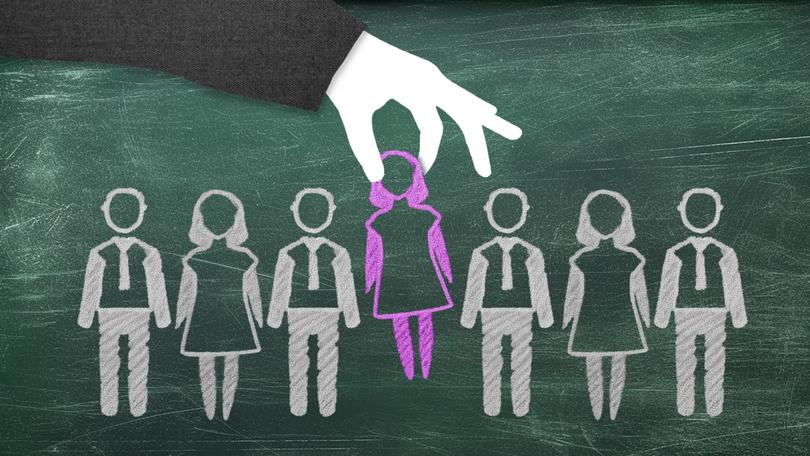MICHAELIA CASH: Prime Minister Anthony Albanese’s decision on religious schools will affect thousands
MICHAELIA CASH: The long-awaited report into religious discrimination and schools will have deep repercussions for tens of thousands of Australian families.

Being in government means hard decisions must be made every day and Australians quite rightly expect a lot of their elected representatives.
Whether it is keeping them safe from dangerous criminals and international threats or helping them through a cost-of-living crisis, Australians demand a government that makes prudent and sound decisions on everything that affects their lives.
The Albanese Government is about to face another one of those moments where the decisions they make will have far-reaching consequences for the way of life of many Australians.
Sign up to The Nightly's newsletters.
Get the first look at the digital newspaper, curated daily stories and breaking headlines delivered to your inbox.
By continuing you agree to our Terms and Privacy Policy.This Thursday is the last possible date for the Government to table the long-awaited report from the Australian Law Reform Commission on religious schools and discrimination law.
It is a report that will affect tens of thousands of families around the country.
This is the inquiry that shocked the religious education sector in January 2023, when it released a consultation paper outlining some proposed reforms.
It prompted the National Catholic Education Commission to say that the proposed reforms would “make it impossible for Catholic schools to be Catholic”.
It said the ALRC’s proposed reforms — which included winding back protections in the Fair Work Act and repealing key provisions of the Sex Discrimination Act — would fail to provide real protections for religious schools to effectively operate and teach according to their religious beliefs and ethos.
Amid the furore, the Government meekly pushed back the reporting date of the ALRC to December 31.
The Government has had the report for a few months now, and at some point this week we should find out what it plans to do to our religious schools.
In a technical legal sense, the ALRC report is quite narrow. It will deal with exemptions in the Sex Discrimination Act that have applied to faith-based schools for the past 40 years, and some other pieces of legislation.
But it is about much more than that. It is about the role that our faith-based institutions play in our society.
It is about whether we value and protect them and whether the law can or should be used to force our religious bodies to change their practices or uproot deeply held and sacred beliefs.

This ALRC report will bring the whole religious discrimination debate to a head and come Thursday, the Government will have a lot of questions to answer.
First, will the Government’s reforms drive school fees up?
If the Government winds back existing protections, it will increase their exposure to litigation.
The Government’s proposed “costs protection” Bill that is currently in Parliament would virtually guarantee that schools would need to pay for the legal costs of defending discrimination lawsuits and may even need to pay for others to make unsuccessful complaints against them.
Insurers price in these sorts of risks. Higher risks become higher premiums, which in turn become higher school fees.
Second, how will religious schools be able to maintain their values?
The reason so many families are sending their children to religious schools is because of the values and the ethos that run through every part of that school community.
For many schools, this means that every member of the staff — from the gardener to the maths teacher to the principal — models that faith every day, in their bearing, life and relationships.

Under current law, schools are allowed to act in good faith to follow their religious teachings. These are the laws that make it possible to build a school culture around religious values and are the protections the ALRC has said should be repealed.
So if schools can now be sued for acting in good faith in accordance with their religious beliefs, how will they maintain their values?
And what does that mean for the families who choose to educate their children at those schools? Will the Government respect their choice?
Third, could religious schools now be sued for teaching religious doctrines?
Questions of faith reach across all parts of life. From what you should eat, to what it means to be married, different religions have different teachings.
Some people won’t like those teachings. But the issue here isn’t whether any particular religious teaching is right. The issue is whether religious schools could be sued for teaching them.
If the Government winds back protections under the Sex Discrimination Act, what happens when a person sues a school under that Act? Will the school be able to rely on protections in a completely different law, such as a Religious Discrimination Act?
And if not, does the school simply need to hope the plaintiff runs their lawsuit badly?
Fourth, can you now be sued for comments about religion?
The Attorney-General moved to introduce religious vilification laws in 2022. These types of laws make it unlawful to say things that, depending on the threshold, ridicule or offend someone’s religion. He may do so again this week.
The difficult question is always the threshold. When is a statement about religion a fair comment, and when is it “severe ridicule”?
Historically, laws that prevented a person from ridiculing a person’s religious beliefs weren’t called vilification laws. They were called blasphemy laws. Are we about to inadvertently go down the path of having laws against blasphemy?
When should the law step in and make it illegal to say something about Catholic communities? Or Muslim communities? Or Scientology? Or a cult?
These are all difficult questions the Government will need to answer, this week before they start winding back protections for religious bodies.
I have asked schools all around the country whether protections should stay in place. And they all say one thing.
They want to educate, not litigate. They care deeply about their students. They take a pastoral approach.
You can’t build that sort of culture by accident. It takes years of work, made possible by the law.
But for many thousands of families around Australia, it is the reason they choose to send their children to that school.
We will find out this week whether the Government respects that choice.
